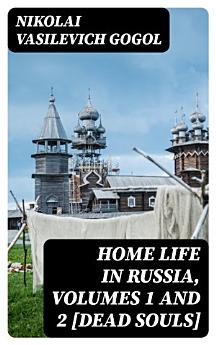Home Life in Russia, Volumes 1 and 2 [Dead Souls]
Nikolai Vasilevich Gogol
Aug 2022 · DigiCat
Ebook
284
Pages
family_home
Eligible
info
reportRatings and reviews aren’t verified Learn More
About this ebook
In "Home Life in Russia, Volumes 1 and 2 [Dead Souls]," Nikolai Vasilevich Gogol delves into the nuances of Russian society in the early 19th century. This seminal work adopts a satirical tone to explore themes of bureaucracy, social hierarchy, and the moral dilemmas faced by individuals within the rigid class system. Through richly detailed characterizations and vivid depictions of the societal landscape, Gogol critiques the complacency and corruption that pervades provincial life, employing a blend of realism and surrealism that invites readers into a world both familiar and grotesque. The work stands as a touching portrait of the everyday struggles of ordinary Russians juxtaposed with the absurdities of their existence, marking it as a cornerstone of Russian literature. Nikolai Gogol, a pivotal figure in Russian literature, emerged from a Ukrainian background, which influenced his keen observations of both the peasant and gentry classes in Russia. His unique ability to distill the essence of human character informs the biting humor and poignant social commentary in his work. Gogol's personal experiences, including his own encounters with bureaucracy and a yearning for societal reform, drive the narrative of "Dead Souls," a poignant reflection on identity and moral decay. I highly recommend "Home Life in Russia" for anyone seeking a profound understanding of Russian culture and literature. Gogol's incisive commentary resonates beyond its historical context, offering timeless insights into human folly and the quest for authenticity. This dual volume is essential reading for scholars and casual readers alike, as it captures the complexities of the human condition through an unmistakable lens of wit and empathy.
About the author
Nikolai Vasilevich Gogol (1809-1852) was a preeminent Russian writer of Ukrainian origin, considered one of the most important figures of the 19th century Russian literature. Gogol's unique literary style fused a rich blend of realism, romanticism, and grotesque satire, which later influenced Russian writers, including Dostoevsky, and the absurdist tradition. He is best recognized for his novel 'Dead Souls,' a satirical expose of the corrupt social and moral fabric of Russian society during the age of serfdom. Initially published as 'Home Life in Russia, Volumes 1 and 2,' 'Dead Souls' employed the trope of a con man purchasing deceased serfs to critique the social and bureaucratic ills of the time. Furthermore, Gogol's short stories, such as 'The Overcoat' and 'The Nose,' exhibited his mastery of characterization and keen observation of the ordinary life, all within a fantastic and surreal narrative style. His works are celebrated for their vivid characterization, linguistic inventiveness, and profound societal insights. Gogol's legacy endures in his portrayal of the complexities of the human spirit and his biting social commentary, which continued to resonate in Russian literature and beyond.
Rate this ebook
Tell us what you think.
Reading information
Smartphones and tablets
Install the Google Play Books app for Android and iPad/iPhone. It syncs automatically with your account and allows you to read online or offline wherever you are.
Laptops and computers
You can listen to audiobooks purchased on Google Play using your computer's web browser.
eReaders and other devices
To read on e-ink devices like Kobo eReaders, you'll need to download a file and transfer it to your device. Follow the detailed Help Center instructions to transfer the files to supported eReaders.






